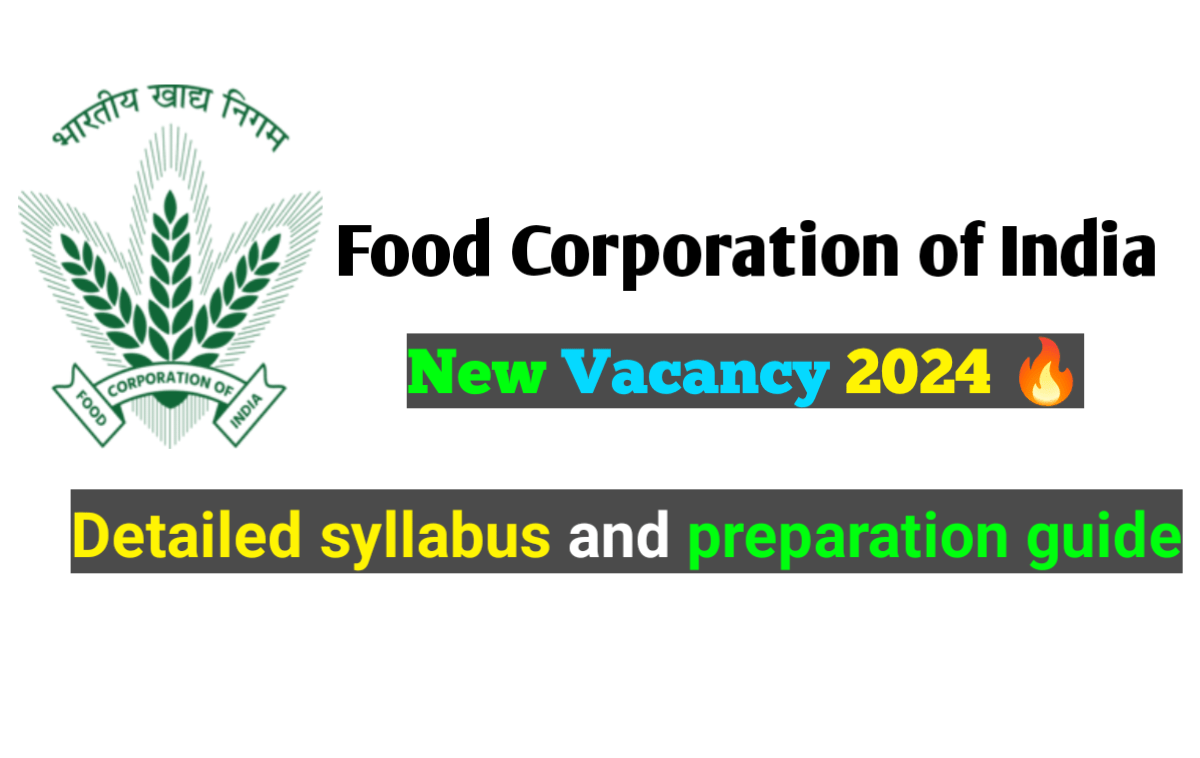The Food Corporation of India (FCI) conducts recruitment for various posts, including managerial and assistant-grade roles. Understanding the detailed syllabus is very crucial for effective preparation. The syllabus for FCI recruitment 2024-25 is divided into Phase 1 and Phase 2. Below is a comprehensive breakdown of the FCI Recruitment Detailed Syllabus and exam structure.
FCI Recruitment Detailed Syllabus: Phase I
The Phase 1 exam is common for all posts and is an objective-type test. It evaluates candidates on general aptitude and awareness.
1. English Language
- Reading Comprehension
- Error Detection
- Fill in the Blanks
- Synonyms and Antonyms
- Grammar and Vocabulary
2. Reasoning Ability
- Seating Arrangements and Puzzles
- Syllogisms
- Coding-Decoding
- Blood Relations
- Input-Output
- Direction Sense
3. Numerical Aptitude
- Simplification and Approximation
- Data Interpretation
- Number Series
- Profit and Loss
- Time and Work
- Probability
4. General Studies
- Indian History, Economy, and Geography (up to Class 8 level)
- General Science
- Current Affairs (national and international importance)
FCI Recruitment Detailed Syllabus: Phase II
The syllabus for this section is different for different posts. The detail syllabus for each of the posts is given below:
1. Manager (Technical) Syllabus
Candidates applying for technical roles need a strong foundation in scientific and agricultural concepts. Below is a detailed list of topics for the Manager (Technical) position:
1.1 Agriculture
- Basics of Agronomy
- Soil Science: Properties, classification, soil fertility, and soil testing
- Irrigation Techniques: Drip irrigation, water conservation, and watershed management
- Crop Production: Major crops in India, pest control, and fertilizers
- Agricultural Practices: Sustainable farming and organic farming
1.2 Biotechnology
- Fundamentals of Biotechnology: Genetic modification and hybrid seeds
- Crop Improvement: Disease resistance and yield enhancement
- Biotechnology in Food: Food safety, GM foods, and biofortification
1.3 Food Science
- Food Chemistry: Composition of food, macronutrients, and micronutrients
- Food Safety and Standards: FSSAI regulations, food adulteration
- Food Processing: Techniques like drying, freezing, and canning
- Post-Harvest Management: Storage methods and shelf-life extension
2. Manager (Accounts) Syllabus
This section focuses on accounting principles, corporate laws, and financial management. Topics include:
2.1 Accounting Standards
- GAAP (Generally Accepted Accounting Principles)
- Accounting for Fixed Assets, Inventories, and Liabilities
- Depreciation Methods: Straight-line and diminishing value
2.2 Financial Statements
- Preparation of Balance Sheets
- Profit and Loss Accounts
- Cash Flow Statements
2.3 Taxation
- Direct and Indirect Taxes: GST, Income Tax basics
- Tax Filing: Procedures and deadlines
2.4 Auditing
- Basics of Auditing: Internal and external audits
- Importance of compliance in auditing
- Common financial frauds and prevention
2.5 Financial Management
- Budgeting: Capital budgeting techniques
- Financial Ratios: Profitability, liquidity, and solvency
- Investment Analysis: Risk and return concepts
3. Manager (Civil/Electrical/Mechanical) Syllabus
- The syllabus for engineering roles focuses on core concepts in civil, electrical, and mechanical engineering.
3.1 Civil Engineering Topics
- Structural Engineering: Types of loads, stress, and strain analysis
- Construction Materials: Cement, steel, and concrete
- Surveying Techniques: Instruments and map reading
- Water Resources: Hydrology and irrigation engineering
- Soil Mechanics: Foundation design
3.2 Electrical Engineering Topics
- Basics of Electrical Circuits: Ohm’s Law, AC/DC concepts
- Power Systems: Transmission and distribution of electricity
- Machines: Motors, transformers, and generators
- Control Systems: Open and closed-loop systems
- Instrumentation: Measurement of electrical quantities
3.3 Mechanical Engineering Topics
- Thermodynamics: Laws, heat engines, and refrigeration
- Fluid Mechanics: Fluid properties, Bernoulli’s equation
- Strength of Materials: Stress, strain, and failure theories
- Production Engineering: Machining and manufacturing processes
- CAD and CAM Basics: Tools for design and automation
4. Manager (Hindi) Syllabus
For the Manager (Hindi) role, the focus is on language skills, grammar, and translation abilities.
4.1 Hindi Grammar
- Sandhi and Samas
- Tenses and Conjugation
- Usage of Muhavare (Idioms) and Lokoktiyan (Proverbs)
- Correct Sentence Construction
4.2 Translation
- Translating official documents from English to Hindi and vice versa
- Vocabulary building for technical terms
- Comprehension skills
4.3 Literature
- History of Hindi Literature: Major authors and periods
- Contemporary Hindi Writing
- Famous Poems and Prose
General Preparation Tips for Paper 2
- 1. Understand the Role-Specific Requirements: Focus on your field of expertise.
- 2. Refer to Standard Books: Use books like “Indian Agriculture by Nem Raj Sunda” for agriculture or “Financial Accounting by Tulsian” for accounts.
- 3. Practice Previous Year Papers: Helps in understanding the pattern and question difficulty.
- 4. Stay Updated: For current topics, keep an eye on industry trends and technological advancements.
- 5. Time Management: Allocate more time to sections that carry higher weightage.
Key Highlights
- 1. Negative Marking: For each incorrect answer, one-fourth of the marks assigned to the question will be deducted.
- 2. Weightage of Phases: While Phase 1 serves as a screening test, Phase 2 scores significantly impact the final selection.

